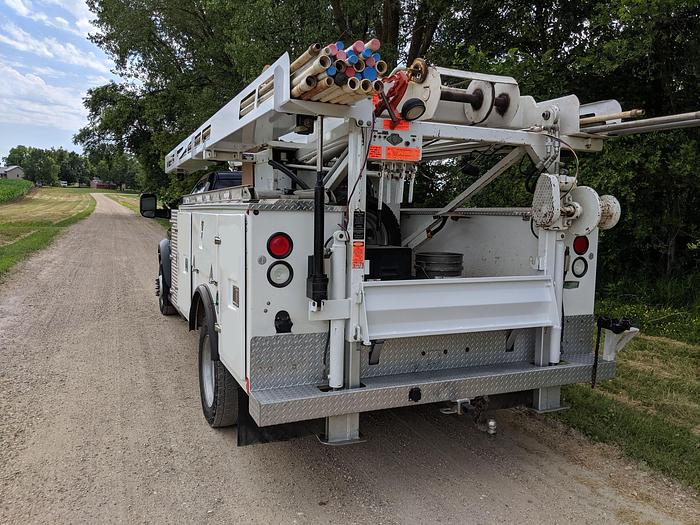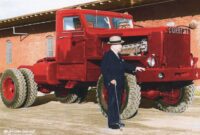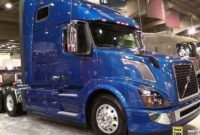Pump Hoist Trucks For Sale: Your Comprehensive Guide to Acquiring Essential Well Servicing Equipment pickup.truckstrend.com
In the demanding world of water well drilling, maintenance, and environmental remediation, specialized equipment isn’t just an advantage – it’s a necessity. Among the most vital pieces of machinery for these operations is the pump hoist truck. These powerful, versatile vehicles are the backbone of many well-servicing businesses, enabling the safe and efficient removal and installation of submersible pumps, well casing, and other downhole equipment.
For contractors, municipalities, and well service companies, the decision to purchase a pump hoist truck is a significant investment that directly impacts operational efficiency, safety, and profitability. Whether you’re expanding your fleet, replacing an aging unit, or entering the well-servicing industry, understanding the intricacies of pump hoist trucks for sale is crucial. This comprehensive guide will navigate you through everything you need to know, from their fundamental purpose to acquisition strategies, helping you make an informed and valuable investment.
Pump Hoist Trucks For Sale: Your Comprehensive Guide to Acquiring Essential Well Servicing Equipment
What Exactly is a Pump Hoist Truck?
At its core, a pump hoist truck is a heavy-duty vehicle specifically engineered for lifting and lowering heavy loads into and out of wells. While often mistaken for standard boom trucks or cranes, pump hoist trucks are purpose-built with features optimized for well servicing.
Key components typically include:
- Heavy-Duty Truck Chassis: Provides the mobile platform, engine power, and stability.
- Hydraulic Winch/Hoist System: The heart of the truck, designed for controlled, high-capacity lifting and lowering of pumps, piping, and other well components. Winch capacities can range from a few thousand pounds to tens of thousands of pounds.
- Telescopic Boom: A hydraulically extendable arm that provides the reach and leverage for positioning loads directly over the wellhead.
- Wellhead Access System: Often includes a hydraulic or manual slide-out deck, allowing the operator to position the boom directly over the well for precise alignment.
- Tool Storage and Work Area: Integrated compartments and a flatbed for carrying tools, pipes, and other necessary equipment.
- Control System: Sophisticated hydraulic controls, often remote-operated, for precise manipulation of the boom and winch.
Unlike general-purpose cranes, pump hoist trucks are designed for the repetitive, vertical lifting tasks common in well maintenance, prioritizing controlled speed, precision, and safety in tight operational spaces.
The Critical Role of Pump Hoist Trucks

Pump hoist trucks are indispensable across several critical sectors:
- Water Well Servicing: Their primary role involves the installation, removal, and maintenance of submersible well pumps, which can be located hundreds of feet underground and weigh thousands of pounds with their associated piping.
- Geothermal Drilling: Used for installing and servicing geothermal heat exchange loops.
- Environmental Remediation: Essential for installing and extracting monitoring wells, remediation pumps, and other equipment in contaminated sites.
- Oil and Gas (Smaller Scale): Sometimes employed for specific tasks in smaller, shallow oil and gas wells.
- Mining: Used for dewatering operations and equipment installation in certain mining contexts.

Their importance lies in ensuring operational safety, minimizing downtime, and providing the necessary power and precision to handle heavy, awkward loads in often remote and challenging environments. Without a reliable pump hoist truck, many essential well-servicing tasks would be impossible or exceedingly dangerous.
Key Features and Specifications to Look For When Buying
When evaluating pump hoist trucks for sale, understanding the critical specifications will help you match the right machine to your operational needs:
- Hoist Capacity (Winch Rating): This is paramount. Determine the maximum weight you anticipate lifting (pump, motor, piping, water column). Capacities typically range from 5,000 lbs to over 30,000 lbs. Always factor in a safety margin.
- Boom Length and Reach: Consider the depth of wells you service and any overhead obstructions. Longer booms offer more versatility but can affect maneuverability.
- Truck Chassis and Engine:
- GVWR (Gross Vehicle Weight Rating): Ensure the chassis can safely support the hoist, boom, and maximum anticipated load, plus tools and accessories.
- Engine Horsepower and Torque: Sufficient power is needed for both road travel and powering the hydraulic system.
- Axle Configuration: Tandem axles offer better weight distribution and stability for heavier units.
- Transmission: Automatic transmissions are common for ease of operation, but manual options exist.
- Hydraulic System: Inspect the pump, hoses, and cylinders for leaks or wear. A robust hydraulic system is vital for smooth, reliable operation.
- Controls: Modern trucks often feature wireless remote controls for enhanced safety and operator visibility. Ensure controls are intuitive and responsive.
- Safety Features: Look for emergency stops, overload protection systems, anti-two block devices, and robust outriggers for stability.
- Deck and Storage: Ample, well-organized storage for tools, pipe racks, and a durable work deck are practical considerations.
- Power Take-Off (PTO): The mechanism that transfers power from the truck’s engine to the hydraulic pump. Ensure it’s in good working order.
New vs. Used Pump Hoist Trucks: Weighing Your Options
The choice between new and used equipment significantly impacts cost, warranty, and potential for downtime.
New Pump Hoist Trucks:
- Pros: Latest technology, full manufacturer warranty, customizable specifications, lower initial maintenance needs, financing options often more favorable.
- Cons: Higher upfront cost, longer lead times for custom builds, rapid depreciation in the first few years.
Used Pump Hoist Trucks:
- Pros: Significantly lower purchase price, immediate availability, less depreciation, wider selection of older models that might still be perfectly functional.
- Cons: No warranty (or limited), higher potential for immediate repairs, unknown service history, older technology, potential for hidden issues.
For used trucks, a thorough inspection by a qualified mechanic specializing in heavy equipment is non-negotiable. Request maintenance records and, if possible, observe the truck in operation.
Where to Find Pump Hoist Trucks For Sale
Finding the right pump hoist truck requires exploring various channels:
- Specialized Heavy Equipment Dealerships: Many dealerships focus specifically on construction, utility, or well-drilling equipment. They often have new and high-quality used units.
- Online Marketplaces: Websites like MachineryTrader.com, EquipmentTrader.com, IronPlanet, and Ritchie Bros. Auctioneers feature extensive listings from dealers and private sellers worldwide.
- Auction Houses: Physical and online auctions (e.g., Ritchie Bros., IronPlanet) can offer competitive prices, but buying at auction requires careful due diligence as sales are often "as-is, where-is."
- Direct from Manufacturers: Companies like Versa-Lift, Badger, and others may offer direct sales or have authorized dealers.
- Industry Forums and Networks: Professional associations and online forums for well drillers often have classified sections or members looking to sell equipment.
- Private Sellers: Sometimes, smaller companies or individuals upgrading their fleet will sell directly, potentially offering good deals but requiring extra vigilance on the buyer’s part.
Important Considerations When Buying
Beyond the technical specifications, several practical and financial factors need careful thought:
- Budget: Establish a clear budget that includes not just the purchase price but also potential transportation costs, taxes, registration, insurance, and initial maintenance/repairs.
- Condition Assessment: For used trucks, a pre-purchase inspection by an independent, certified mechanic is crucial. Check the engine, transmission, hydraulic system, hoist mechanism, boom integrity (look for cracks or welds), frame, tires, and electrical system. Test all functions.
- Maintenance History: Request detailed service records. A well-maintained truck, even with high hours, can be a better investment than a low-hour unit with a neglected history.
- Regulatory Compliance: Ensure the truck meets all local, state, and federal regulations for vehicle emissions, roadworthiness, and hoisting equipment safety (e.g., OSHA standards).
- Load Testing: If possible, insist on a load test to verify the hoist’s actual capacity and stability under stress.
- Transportation: Factor in the cost and logistics of transporting the truck, especially if buying out of state.
- Financing: Explore financing options early. Banks, credit unions, and equipment finance companies offer specialized loans for heavy machinery.
Tips for a Successful Purchase
- Do Your Homework: Research specific models, their common issues, and market values.
- Be Patient: Don’t rush into a purchase. The right truck will come along.
- Ask Lots of Questions: Don’t be afraid to probe sellers about the truck’s history, reasons for selling, and any known issues.
- Bring an Expert: If you’re not an expert in heavy equipment, bring someone who is for the inspection.
- Negotiate: Most prices, especially for used equipment, are negotiable.
- Verify Documentation: Ensure all titles, registrations, and maintenance records are legitimate and complete.
Potential Challenges and Solutions
- Finding Specific Configurations: Some specialized jobs require unique boom lengths or hoist capacities. Solution: Be prepared to search wider, consider custom fabrication (for new trucks), or accept a slightly different configuration that still meets your core needs.
- Hidden Mechanical Issues: Used equipment can hide problems. Solution: The independent pre-purchase inspection is your best defense. Also, look for signs of fresh paint that might cover rust or damage.
- Transport Logistics: Moving a large, heavy truck can be complex and expensive. Solution: Get multiple quotes from specialized heavy haul companies. Ensure proper permits and escorts if required.
- Parts Availability for Older Models: Discontinued models might have hard-to-find parts. Solution: Research parts availability before buying an older unit. Check with manufacturers or aftermarket suppliers.
- Financing Hurdles: Securing a loan for specialized equipment can be challenging. Solution: Have a strong business plan, good credit, and explore various lenders, including those specializing in equipment financing.
Illustrative Pump Hoist Truck Price Guide
Please note: Prices for pump hoist trucks vary wildly based on manufacturer, hoist capacity, boom length, truck chassis, age, condition, hours of use, and specific features. This table provides illustrative price ranges and factors to help you understand the market, rather than exact current market prices.
| Condition/Age Category | Approximate Price Range (USD) | Key Features/Notes | Factors Influencing Price |
|---|---|---|---|
| New/Current Model | $250,000 – $600,000+ | Latest technology, full warranty, customizable, zero hours, modern safety features. | Brand, hoist capacity, boom length, chassis type, advanced features (remote control, digital displays), customization. |
| Late Model Used | $150,000 – $350,000 | 1-5 years old, low to moderate hours (under 5,000 hrs), good condition, often still under partial warranty or extended warranty options. | Brand, original cost, hours/mileage, maintenance history, condition of hydraulics & engine, remaining warranty. |
| Mid-Life Used | $75,000 – $200,000 | 5-15 years old, moderate to high hours (5,000 – 15,000 hrs), good working order but may show wear. | Brand, hours/mileage, maintenance history, overall mechanical condition, cosmetic wear, tire condition. |
| Older/High-Hour Used | $30,000 – $100,000 | 15+ years old, high hours (15,000+ hrs), functional but may require immediate repairs or ongoing maintenance. | Age, hours/mileage, significant mechanical issues, rust, condition of boom & winch, major component replacement history. |
| "As-Is" Salvage/Parts | $10,000 – $50,000 | Non-operational, major mechanical failures, suitable for parts or extensive rebuilding. | Extent of damage, salvageable components, brand, potential for repair. |
Important Note on Pricing: These are broad estimates. A low-hour, meticulously maintained 10-year-old truck from a premium brand might command a higher price than a higher-hour, less maintained 5-year-old truck from a less renowned manufacturer. Always factor in inspection costs, potential repairs, and transportation when budgeting.
Frequently Asked Questions (FAQ)
Q1: What is the average lifespan of a pump hoist truck?
A1: With proper maintenance, a pump hoist truck can have a lifespan of 20-30 years or more. The truck chassis might need replacement or significant overhaul before the hoist and boom components.
Q2: What licenses or certifications are required to operate a pump hoist truck?
A2: Requirements vary by jurisdiction. Typically, a Commercial Driver’s License (CDL) with specific endorsements (e.g., air brakes) is needed due to the vehicle’s weight. Additionally, operators may need specialized training or certification for operating hoisting equipment, often through industry associations or OSHA-compliant programs.
Q3: Can I convert a standard truck into a pump hoist truck?
A3: While theoretically possible, it’s highly impractical and not recommended. Pump hoist trucks require a heavy-duty chassis specifically designed to handle the immense stresses and weight distribution of the hoist and boom. A standard truck frame is not built for this and attempting a conversion would be dangerous and likely non-compliant with safety regulations.
Q4: What are the most common maintenance issues with pump hoist trucks?
A4: Common issues include hydraulic leaks, wear on winch cables and sheaves, issues with outriggers, electrical problems (especially with remote controls), and general engine/transmission wear typical of heavy-duty vehicles. Regular preventative maintenance is key to minimizing these issues.
Q5: How do I determine the right hoist capacity for my needs?
A5: Calculate the maximum weight of the heaviest pump, motor, and associated piping you anticipate lifting, including the weight of the water column within the pipe. Always add a safety margin (e.g., 20-30%) to this calculated weight to select a hoist with sufficient capacity.
Q6: Are there any specific safety features I should prioritize?
A6: Yes, prioritize trucks with anti-two block systems (prevents the hook block from hitting the boom tip), overload protection systems, emergency stop buttons, robust outriggers with interlocks, and clear load charts. Remote controls also enhance operator safety by allowing them to stand clear of the load.
Conclusion
Acquiring a pump hoist truck is a strategic investment that can significantly enhance your operational capabilities and safety in the well-servicing industry. By understanding the critical features, evaluating the new versus used market, knowing where to source equipment, and diligently performing your due diligence, you can make a purchase that serves your business reliably for years to come.
Remember, a pump hoist truck isn’t just a vehicle; it’s a specialized tool essential for the safe, efficient, and profitable execution of demanding downhole operations. Investing wisely in the right equipment means investing in the future success and safety of your business.



